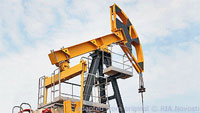Russian Cabinet spars over oil profit investment

(Moscow News – themoscownews.com – Irina Granik, Moskovskiye Novosti – February 11, 2013)
Old arguments have risen again in the government, after the publication of the “Five Years of Effectiveness” economic program earlier this month.
The themes, as before, are how much money should remain in the state reserve in case of a crisis, and how to finance investment projects with state participation.
Economic Development Minister Andrei Belousov considers, first, that without an increase in state investments in infrastructure (in comparison with those planned) it is impossible to improve the effectiveness of the economy.
Second, he believes that in the development of transportation infrastructure, for example, an emphasis should be placed on unreturnable budget investments, rather than placing trust in investors’ cash.
“The low throughput capability of the transportation system devalues our strengths in the improvement of the investment climate, and does not contribute to growth in the economy of higher than 3 percent,” Belousov said.
He proposes to change the adopted “budget rule,” in agreement with which the Reserve Fund, formed on the basis of oil and gas revenues, has to reach 7 percent of GDP, whereupon half of the rest of the oil money is sent to the National Welfare Fund, and the other half to investments in infrastructure.
Belousov, like many deputies in the State Duma, proposes to use oil revenues for investment, as soon as the Reserve Fund reaches 5 percent of GDP.
But the affair lies not just in the 2 percent difference. Belousov thinks that the principle used up to this point, where the state and private investors co-finance projects (how the budget investment fund worked until recently), has not justified itself. The risks of investors not meeting their obligations showed themselves to be too high.
In addition, Belousov is sure that it is unnecessary to count on returns on investments in large infrastructure projects. The budget should fund many of these projects on a non-return basis.
As a result, Belousov has proposed to the government to create a development fund on oil money, which as soon as 2016 could have up to 400 billion rubles.
Andrei Belousov, economic development minister:
The investments in the majority of projects related to the development of transportation infrastructure have an unreturnable character. This is how it is around the world. And these projects have to be made on the budget’s account – there is no other source.
Therefore, we pose the question of the creation within the budget of a special fund that will be directed to the resolution of tasks related to investment. I’m talking about mechanisms for the use of part of oil and gas revenues from the Reserve Fund in the framework of an investment program where these investments are non-returnable.
And we propose to lower the level of deposits in the Reserve Fund from 7 percent to 5 percent of GDP, and the development fund will be formed on the account of the 2 percent. This is not a softening of the budget rule.
The Finance Ministry itself is not opposed, it is only proposing that the development fund be invested in when the Reserve Fund reaches 7 percent. But this will only happen in 2015 or 2016, and if the price of oil is $110 per barrel. But it’s already late. We’re losing three years.
Anton Siluanov, finance minister:
We should secure growth in the economy not – as some colleagues, maybe, think – on the account of the increase of income in the federal budget, but specifically on the account of the creation of conditions for attracting investment.
And what are these? These are, as we say, an understandable, transparent economic policy of the state, so investors who now have money in the world would deposit immediately in our economy. These are an understandable budget policy.
I am thinking that we adopted the budget rules and, naturally, now need to follow them in the coming years, in order that the scale of budget obli ations be fixed, and in order that we be able, unconditionally, to meet them in any situation, independent of the external political environment.
Arkady Dvorkovich, deputy prime minister:
A special fund is needed, but discussions of its final parameters – including amounts – still lie ahead. And the government will make a decision on this subject….
What concerns “the loss of three years,” I think that in the framework of the existing scale of state investments, there is a significant potential for increased effectiveness, and we can make it so that three years would not pass by.
More important now is not a greater scale of state resources, but finding attractive mechanisms for private co-investors for financing in the framework of the resources that are there today.
At first, show me how the model of financing will work with the attraction of non-budget financing, and show how much will be needed to give from the budget. Not 100 percent of the money, but what share will be optimal? And then we will say how to find this money, but not the other way around.
Igor Shuvalov, first deputy prime minister:
There are various opinions, including within the [State Duma], that 7 percent of GDP declared reserves are unnecessary, that they can be limited to 5 percent. The rest of the money, which will come from above the 5 percent, will be directed to those projects that have a short horizon for completion, two to three years.
This is infrastructure – roads, ports, airports, railroad infrastructure. But this still does not mean that we will reach this decision. This decision should be made, first, by parliament, and should be strengthened by law, which will be supported by the government and approved by the president.
